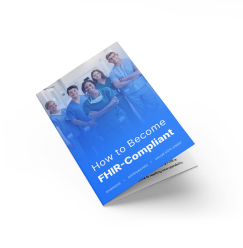In a world where healthcare data is the lifeblood of medical progress, efficient data access and retrieval are nothing short of essential. Yet until recently, accessing and managing all that valuable data could be a real hassle. That's where the Bulk FHIR API struts onto the scene. FHIR Bulk Data API helps doctors make informed decisions, streamlines hospital operations and fuels groundbreaking research through its efficient handling of large-scale exports of data.
At Binariks, we have a bunch of experience with FHIR. We're here to share our passion for ensuring a flexible, standards-based framework for interoperability and data exchange and spill the beans on how the FHIR bulk API works. Let's dive in!
What is the FHIR bulk API
The healthcare industry is undergoing a digital transformation driven by the need for efficient data management and exchange. At the heart of this transformation lies the FHIR (Fast Healthcare Interoperability Resources) standard, a standardized language for exchanging electronic health records (EHR) data.
While regular FHIR REST APIs excel in handling small amounts of data, they can falter when confronted with large-scale data exports. This is where the FHIR Bulk API steps in, providing a streamlined approach to exporting vast quantities of healthcare info.
FHIR Bulk Data, also known as FHIR Bulk Export, refers to the standardized process of exporting large volumes of healthcare data using the FHIR healthcare standard . It addresses the limitations of traditional FHIR APIs (those designed for retrieving individual resources rather than entire datasets) and thus helps to avoid performance issues and prevent errors.
That's why FHIR implementation is a pivotal step forward in healthcare data management, enabling seamless and efficient data exchange. But how exactly does this work?
How the bulk FHIR works
Unlike traditional FHIR APIs, which excel in retrieving individual resources, the FHIR Bulk API is specifically designed to handle large-scale data exports, making it an indispensable tool for healthcare organizations. It operates through a well-defined workflow and here's a step-by-step breakdown:
- Initiating the bulk data export request: The FHIR Bulk Data Client initiates the process by sending an asynchronous request to the FHIR Resource Server. This request specifies the desired data to be exported, the preferred format (e.g., NDJSON, CSV), and any applicable filters or parameters.
- Processing the bulk data export request: Upon receiving the request, the FHIR Resource Server begins processing the bulk data export. It identifies the relevant data based on the client's specifications and prepares it for export.
- Generating the output data files: The FHIR Resource Server generates the output data files in the requested format, ensuring that the data is accurately represented and adheres to the specified format.
- Storing the output data files: The generated output data files are stored on the Output File Server, which acts as a secure repository for the exported data.
- Providing access to the output data: Once the export process is complete, the FHIR Resource Server notifies the FHIR Bulk Data Client of the availability of the output data files. The client can then access these files from the Output File Server, either directly or through a provided URL.
The FHIR Bulk API incorporates specific technical concepts and terms as integral components of its functionality, each playing a defined role in the standardized process of exporting large volumes of healthcare data using the FHIR standard:
- /$export: A special FHIR operation used to initiate bulk data export requests.
- FHIR Batch: A mechanism for grouping multiple FHIR resources into a single request, enabling efficient processing of large datasets.
- FHIR Export: The process of extracting and converting FHIR resources into a specified format for external use.
- FHIR Bulk: Refers to the standardized approach for exporting large volumes of FHIR resources using the FHIR Bulk API.
Harness the full potential of healthcare interoperability with Binariks
Benefits with FHIR bulk API
FHIR Bulk API implementation offers a multitude of benefits that streamline healthcare operations, enhance research, and ultimately improve patient care. Here are a few examples.
Standardization
The FHIR Bulk API introduces a standardized approach to large-scale data export, eliminating the need for custom solutions and ensuring compatibility between different healthcare systems. This standardization promotes interoperability and facilitates seamless data exchange across diverse healthcare organizations.
Improved cost management
By streamlining the data export process and reducing the need for costly manual interventions, the FHIR Bulk API contributes to significant cost reductions for healthcare organizations. These cost savings can be reinvested into other critical areas of healthcare operations, further enhancing patient care.
Increased efficiency
The FHIR Bulk API significantly improves the efficiency of large-scale data export, enabling healthcare organizations to quickly and easily access and share large datasets. This enhanced efficiency streamlines various healthcare processes, like research, regulatory compliance, and patient care coordination.
Compliance with regulatory requirements
The FHIR Bulk API facilitates compliance with various regulatory requirements related to healthcare data management and exchange. Its standardized approach ensures that exported data meets regulatory standards, reducing the risk of non-compliance and its associated penalties.
Enhanced research opportunities
The FHIR Bulk API enables researchers to access large-scale healthcare datasets in a timely and efficient manner, facilitating groundbreaking research in various medical fields. This access to comprehensive data accelerates the development of new treatments, diagnostic tools, and preventive measures.
Improved patient care coordination
The FHIR Bulk API enables seamless sharing of patient data across healthcare providers, fostering coordinated care and improved patient outcomes. By facilitating a comprehensive view of a patient's medical history, providers can make informed decisions and deliver personalized care.
The benefits of FHIR are a crucial step towards achieving a more efficient, interoperable, and data-driven healthcare ecosystem for every modern healthcare institution.
How to become FHIR-compliant
A detailed approach to FHIR implementation

Real-life scenarios & applications of the FHIR bulk data
FHIR Bulk API's ability to handle large-scale data exports has opened up new possibilities for data-driven healthcare initiatives.
Migrating data between healthcare systems
When healthcare organizations merge, acquire new facilities, or switch electronic health record (EHR) systems, they face the challenge of migrating large volumes of patient data.
The FHIR Bulk API simplifies this process by enabling efficient and standardized data transfers between different healthcare systems. This ensures data integrity and continuity of care during system transitions.
Sharing data with clinical researchers
Clinical researchers often require access to large-scale healthcare datasets to conduct meaningful research. The FHIR Bulk API facilitates secure and controlled data sharing with researchers, enabling them to access relevant patient data for their studies. This streamlined data sharing accelerates research progress and advances medical knowledge.
Public health surveillance
Public health agencies rely on aggregated healthcare data to monitor disease outbreaks, identify trends, and implement effective prevention strategies. The FHIR Bulk API enables the efficient collection and analysis of large-scale healthcare data, facilitating real-time public health surveillance and timely interventions.
Health Information Exchange
Health information exchanges (HIEs) serve as repositories for healthcare data from multiple providers, enabling secure data sharing and improved care coordination. The FHIR Bulk API plays a crucial role in HIE operations by enabling efficient data imports and exports, ensuring that the HIE maintains up-to-date and comprehensive patient information.
Clinical trial data management
Clinical trials generate vast amounts of patient data that need to be collected, managed, and analyzed. The FHIR Bulk API facilitates the efficient import and export of clinical trial data, streamlining data management processes and ensuring compliance with regulatory requirements.
Population health management
Population health management involves analyzing large-scale healthcare data to identify patterns and trends, leading to targeted interventions to improve the overall health of a population.
The FHIR Bulk API enables the efficient collection and analysis of population health data, facilitating informed decision-making and effective population health management strategies.
Quality improvement initiatives
Healthcare organizations continuously strive to improve their quality of care by analyzing performance data. The FHIR Bulk API facilitates the efficient extraction of quality metrics data, enabling organizations to identify areas for improvement and implement targeted quality improvement initiatives.
Regulatory compliance
Healthcare organizations are subject to various regulatory requirements related to data management and exchange. The FHIR Bulk API helps organizations ensure compliance with these regulations by providing a standardized and audit-friendly approach to data export.
Healthcare analytics and predictive modeling
The FHIR Bulk API facilitates the efficient collection of large-scale healthcare data, enabling advanced analytics and predictive modeling. This allows healthcare organizations to identify patterns, predict trends, and make data-driven decisions to improve patient care and resource allocation.
Improved interoperability for a healthcare referral platform
Revamping solution architecture and enabling interoperability with FHIR
Our experience with FHIR implementation
At Binariks, we are dedicated to empowering healthcare organizations with FHIR-compliant solutions. Our team of experienced architects and software developers provides comprehensive services to streamline data management and enhance interoperability.
We have a proven track record of successfully implementing FHIR solutions. Our expertise encompasses FHIR integration, data migration, consulting services, and creating custom interoperability solutions that comply with FHIR. Contact us today to discuss your specific FHIR needs and start your journey toward a more connected, data-driven healthcare ecosystem.
Conclusion
The healthcare industry stands at the precipice of a data-driven revolution fueled by the standardization and efficient exchange of EHR data. The FHIR standard has emerged as the cornerstone of this transformation, enabling seamless data exchange and fostering collaboration across healthcare organizations.
By streamlining data exports and enhancing interoperability, the FHIR Bulk API has opened up new possibilities for data-driven healthcare initiatives, such as research, public health surveillance, and population health management.
Binariks stands ready to partner with healthcare organizations, providing the expertise and guidance necessary to embrace the full potential of FHIR and transform healthcare for the better.
FAQ
Share

